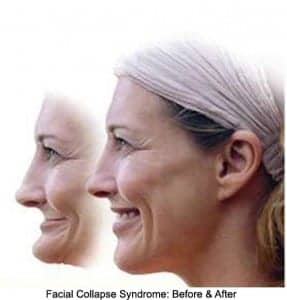When you lose all your teeth, you have several problems that need to be fixed. The first is being able to eat normally. You want to be able to chew all the foods you enjoy and you want to be able to taste them. Then you also want to restore your appearance. Smiling is important, and you want your smile to be attractive and warm. Finally, your teeth affect your speech and you want to be able to speak normally, without whistles and lisps.
For years, people have turned to dentures to replace missing teeth. But there are compromises with using removable dentures, and there is a much better way.
The Problems with Dentures
They Decrease Your Chewing Efficiency
Even the best-fitting set of dentures your dentist can make will only have 50% of the chewing efficiency of your natural teeth. That’s the best you can expect. The reason is that removable dentures have to rest on soft tissue, and soft tissue moves. Upper dentures are a little more stable because they are retained by suction. When they are new, they will move around a little, but not a lot. But lower dentures pretty much just float in your mouth. They will tip if you just bite on one side. You have to train your lips and your tongue to help keep them in place, and it’s never quite the same for you as it used to be when you had teeth.
They Slip and Fall Out
When dentures are brand new, they generally fit acceptably. But with no teeth present, your body begins to re-absorb the jawbone and over time they will become more loose. Denture wearers often have to rely on denture adhesives to hold them in place, but these are messy and aren’t a perfect solution. Even if they don’t actually fall out in public, the fear that they might can eat away at your self-confidence.
They Lead to Facial Collapse

Preventing the Problems with Dentures
Using dental implants to anchor the dentures solves all of these problems. The body senses the presence of the implants and bone loss is prevented. There is no slipping, and it feels like you have your own natural teeth back. Since your palate doesn’t need to be covered by a plastic plate, the natural taste and feel of food is restored. There are no extended flanges that could affect your speech. This is what Dr. Arnold wants for his patients. You may click here to read more about how dental implants work.
If you’re interested in getting implant-supported dentures, you may call our office to schedule an appointment or, if you prefer, you may click here to request an appointment online.
